| | | OFFLINE | | Post: 18.096
Post: 756 | Registrato il: 28/08/2005
Registrato il: 20/01/2009 | Administratore | Utente Senior | |
|
 GENERAL AUDIENCE TODAY
GENERAL AUDIENCE TODAY
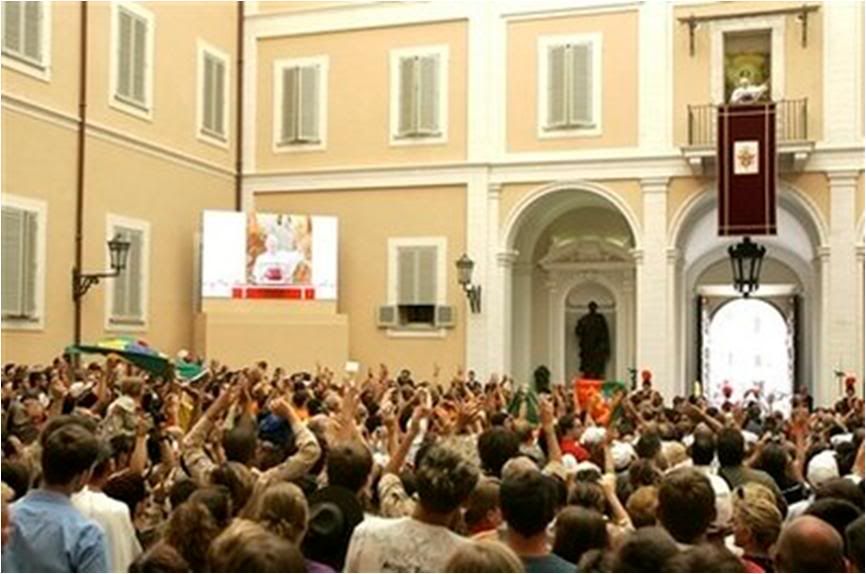
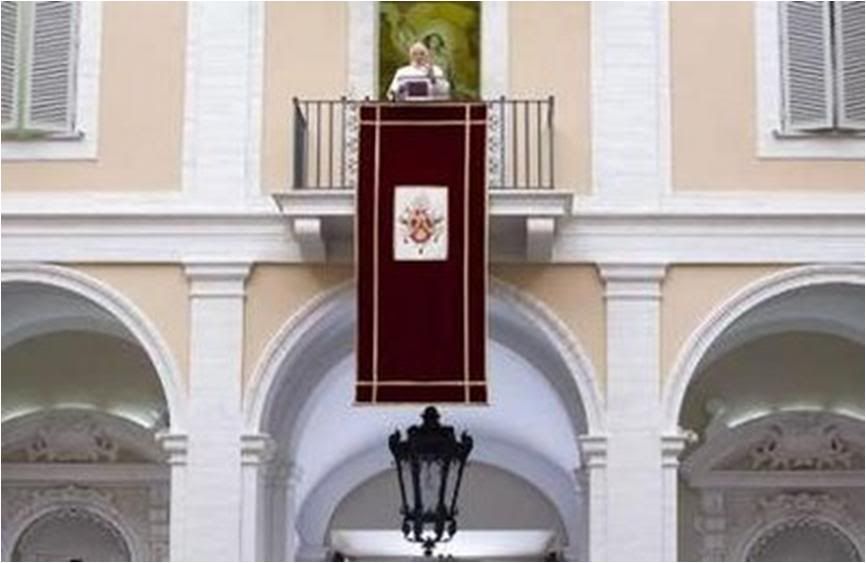
The Holy Father today resumed the Wednesday General Audiences which were not held in July. He held the audience in teh inner courtyard of the Apostolic Palace in Castel Gandolfo.
As he announced last Sunday, he devoted today's catechesis to St. Jean-Baptiste Marie Vianney, the Holy Cure d'Ars, in whose honor he decreed a Year for Priests.
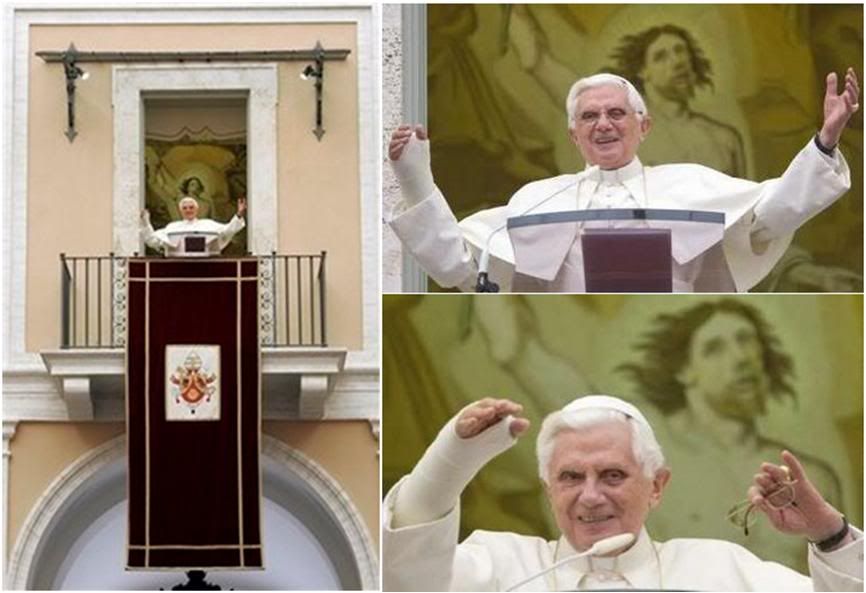
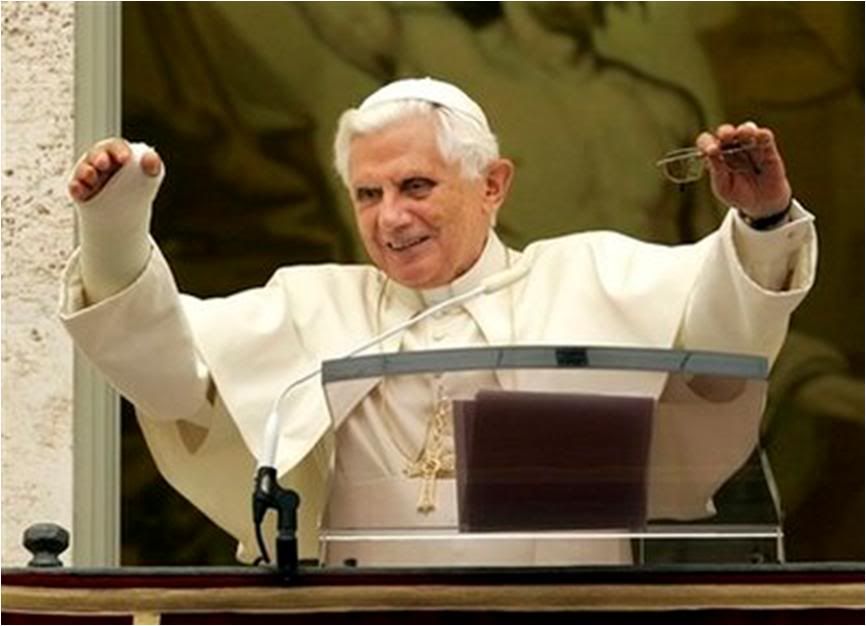
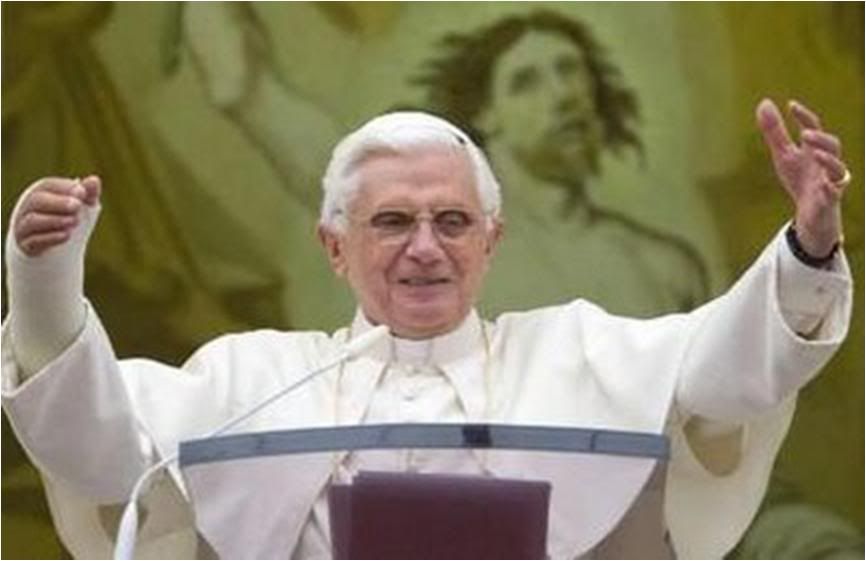
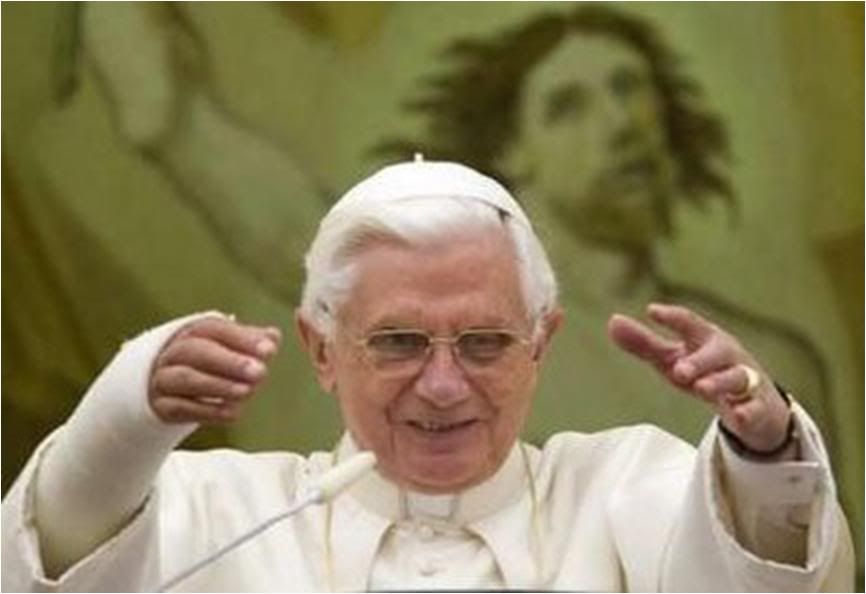 CATECHESIS ON
CATECHESIS ON
ST. JEAN-BAPTISTE MARIE VIANNEY
Here is a full translation of the Holy Father's catechesis today:
Dear brothers and sisters,
In today's catechesis, I wish to review briefly the life of the Holy Curate of Ars, underscoring some traits which can be an example for the priests of our time, certainly very different from those in which he lived, but marked in many ways by the same fundamental human and spiritual challenges.
Yesterday was 150 years since his birth in heaven. Indeed, at 2 a.m. on August 4, 1859, St. Jean-Baptiste Marie Vianney, having ended his earthly existence, went forth to the heavenly father to receive his legacy, the Kingdom prepared since the creation of the world for those who faithfully follow the teachings of God (cfr Mt 25,34).
What a great feast it must have been in Paradise at the arrival of such a zealous pastor! What a welcome must have been given him, by the multitudes of children who had reconciled with the Father, for his work as parish priest and confessor!
I wished to take the occasion of this anniversary to declare a Year for Priests which, as you know, has the theme "Faithfulness to Christ, faithfulness of priests".
Holiness determines the credibility of [Christian] testimony and thus, in a decisive manner, the efficacy itself of the mission of every priest.
Jean Marie Vianney was born in the tiny village of Dardilly on May 8, 1786 to a peasant family, poor in material goods but rich in humanity adn faith. Baptized on the day he was born, as was the custom in those days, he dedicated the years of his childhood and adolescence to working in the fields and pasturing animals, such that at the age of 17, he was still illiterate.
But he knew from memory the prayers taught to him by his pious mother and he was nourished by the religious atmosphere he breathed at home. His biographers narrate that from his infancy, he sought to conform himself to the divine will even in the humblest of tasks.
He nourished in his soul the desire to become a priest but it was not easy for him to do so. In fact, he eventually came to his priestly ordination, after not a few travails and misunderstandings - thanks to the help of wise priests who did not consider only his human limitations but knew how to look beyond them, to see the horizon of holiness in that truly singular young man.
Thus, on June 23, 1815, he was ordained a deacon, and on the following August 13, a priest. Finally, at age 29, after so many uncertainties, not a few failures and so many tears, he could walk up to the altar of the Lord and realize his life's dream.
The Holy Curate of Ars always showed the highest consideration for the gift he had received. "Oh, what a great thing priesthood is! It will not be understood well except in heaven... (because) if it could be understood on earth, one would die - not of fright but of love" (Abbé Monnin, Esprit du Curé d’Ars, p. 113).
As a child, he had confided to his mother: "When I become a priest, I would like to conquer many souls" (Abbé Monnin, Procès de l’ordinaire, p. 1064). And so he did.
In his pastoral service, which was as simple as it was extraordinarily fecund, this anonymous parish priest of a backwoods village in the south of France succeeded so well in identifying himself with his ministry, that he became - in a way that was visible and universally recognized - alter Christus (another Christ), the image of the Good Shepherd, who unlike a hireling, would give his life for his own sheep (cfr Jn 10,11).
Following the example of the Good Shepherd, he gave his life for his flock in the decades of his priestly service. His existence was a living catechesis, which acquired a most special efficacy when the people saw him celebrate Mass, or pray in adoration before the Tabernacle, or spend many hours at the confessional.
The center of his life was the Eucharist, which he celebrated and adored with devotion and respect.
Another fundamental characteristic of this extraordinary figure of a priest was his assiduous ministry of confession. He recognized in the practice of the sacrament of Penance the logical and natural completion of the priestly ministry, obeying Christ's mandate: "Whose sins you forgive are forgiven them, and whose sins you retain are retained" (cfr Jn 29,23).
Thus St. Jean Marie Vianney distinguished himself as an optimal and tireless confessor and spiritual master. Passing "with a single interior movement from the altar to the confessional" where he spent a great part of his day, he sought in every way - through prayer and persuasive counselling - to make his parishioners rediscover the significance and the beauty of sacramental penitence, showing them that it was an intimate demand of the Eucharistic presence (cfr Letter to priests on the Year for Priests).
The pastoral methods of St. Jean Marie Vianney may appear today to be hardly suitable for our present social and cultural conditions. How in fact can a priest today imitate him in a world that has changes do much?
While it is true that times change and that many charisms are specific to a person, and therefore unrepeatable, there is nonetheless a lifestyle and a fundamental yearning that we all are called on to cultivate.
It is apparent that what made the Curate of Ars holy was his humble faithfulness to the mission to which God had called him - his constant abandon, full of trust, into the hands of Divine Providence.
He succeeded in touching the hearts of people not because of his own human gifts, nor even with the sheer and admirable commitment of his will. He conquered souls, even the most refractory, by communicating to them what he intimately lived - his friendship with Christ.
He was 'enamoured' of Christ, and the true secret of his pastoral success was the love that he had for the Eucharistic mystery that he announced, celebrated and lived, which became love for the flock of Christ, for Christians and all persons who seek God.
His witness reminds us, dear brothers and sisters, that for every baptized person - and more so for every priest - the Eucharist is "not simply an event with two protagonists, a dialog between God and myself. Eucharistic Communion leads to a total transformation of one's own life. It opens wide powerfully the entire 'I' of man and creates a new 'we'" (Joseph Ratzinger, Communion in the Church, p. 80).
Therefore, far from reducing the figure of St. Jean Marie Vianney to an example, admirable as it is, of 19th-century denotional spirituality, it is necessary to grasp the prophetic power that mark his human and spiritual personality with the greatest relevance even for our day.
In post-revolutionary France, which experienced a kind of 'dictatorship of rationalism' intended to annul the very presence of priests and of the Church in society, he lived, first of all, during his youth, in heroic clandestinity walking miles at night in order to take part in Holy Mass.
Later, as priest, he distinguished himself by singular and fruitful pastoral creativity, intended to show that the reigning rationalism was in fact far from able to satisfy the authentic needs of man and thus, definitively, not livable.
Dear brothers and sisters, 150 years after the death of the Holy Curate of Ars, the challenges of society today are not any less demanding. Rather, they have perhaps become more complex.
If in his time there was the 'dictatorship of rationalism', in today's age, there is a 'dictatorship of relativism' in many areas.
Both are inadequate responses to man's rightful demand to use his own reason to the full as a distinctive and constitutive element of his own identity.
Rationalism was inadequate because it did not take into account human limitations and claimed to elevate reason alone as the measure for all things, transforming it into a goddess.
Contemporary relativism diminishes reason because it has come to affirm that the human being can know nothing with certainty beyond what science can know positively.
But today, like then, the man "who is a mendicant for meaning and fulfillment" is in constant search for exhaustive answers to the fundamental questions that present themselves ceaselessly.
The fathers of the Second Vatican Council had this 'thirst for truth' which burns in the heart of every man, well in mind when they affirmed that it falls on priests, 'as educators in the faith' to form 'an authentic Christian community' that is capable of opening "to all men the road which leads to Christ' and to exercise 'true maternal action' towards them, indicating and facilitating to non-believers 'stimulus, nourishment and support in the spiritual struggle' (cfr Presbyterorum ordinis, 6).
The teaching that the Holy Curate of Ars continues to transmit to us in this regard is that, at the basis of such pastoral commitment, the priest should have an intimate personal union with Christ, one that he must cultivate and grow day after day.
Only when he is enamoured of Christ can the priest teach this union to others, this intimate friendship with the divine Teacher. Only then can he touch the hearts of men and open them to the merciful love of the Lord.
Consequently, only then can the priest infuse enthusiasm and spiritual vitality into the communities which the Lord entrusts to him.
Let us pray that, through the intercession of St. Jean Marie Vianney, the Lord may give his Church holy priests, and that the desire to sustain and aid their ministry may grow in the hearts of the faithful.
Let us entrust these intentions to Mary, whom we invoke today as Our Lady of the Snow.
In English, he said:
I offer a warm welcome to the English-speaking visitors present at today’s Audience, especially the pilgrimage groups from England, China, Korea and the United States of America.
Yesterday the Church celebrated the one hundred and fiftieth anniversary of the death of Saint John Vianney, the Curé of Ars, who is the patron saint of parish priests.
In this Year for Priests, let us pray that through his intercession all priests will be renewed in love of the Lord, in the joyful pursuit of holiness and in generous commitment to the spread of the Gospel.
Upon you and your families I invoke God’s blessings of joy and peace!
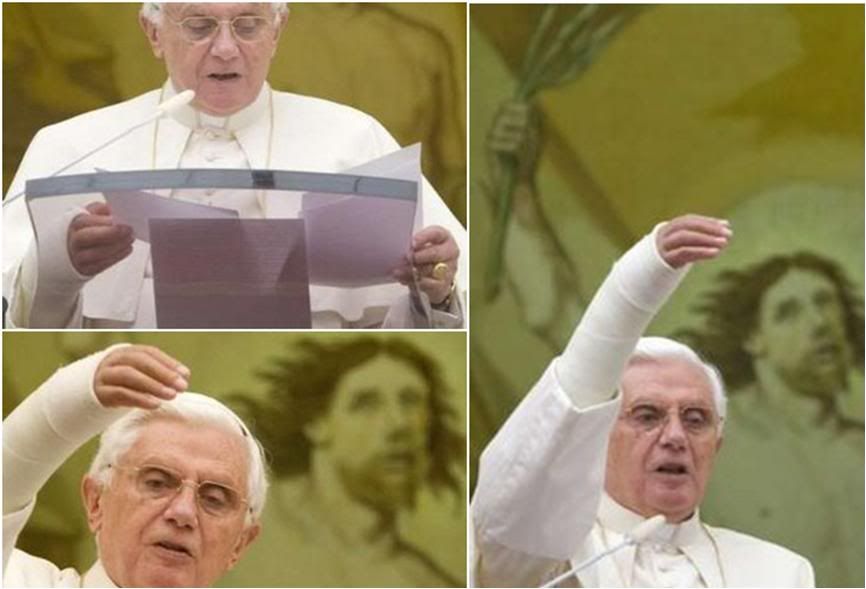
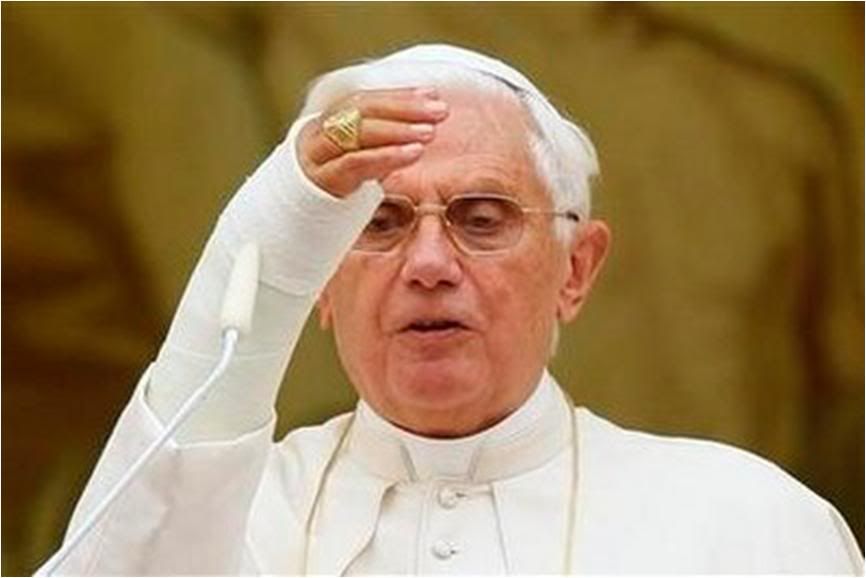 L'Osservatore Romano in its issue tomorrow (8/6) carries these pictures showing the Holy Father greeting the overflow crowd at the GA today, who gathered in the town square in front of the Apostolic Palace at Castel Gandolfo.
L'Osservatore Romano in its issue tomorrow (8/6) carries these pictures showing the Holy Father greeting the overflow crowd at the GA today, who gathered in the town square in front of the Apostolic Palace at Castel Gandolfo.
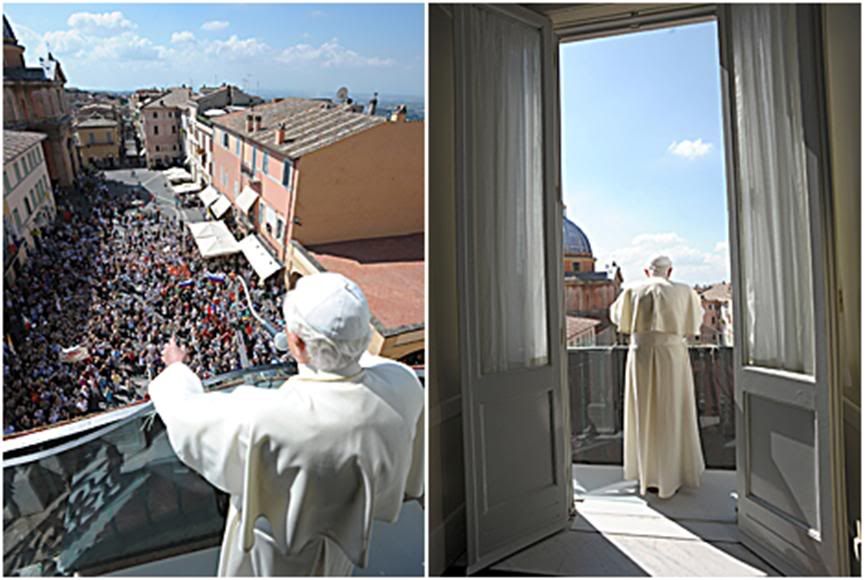
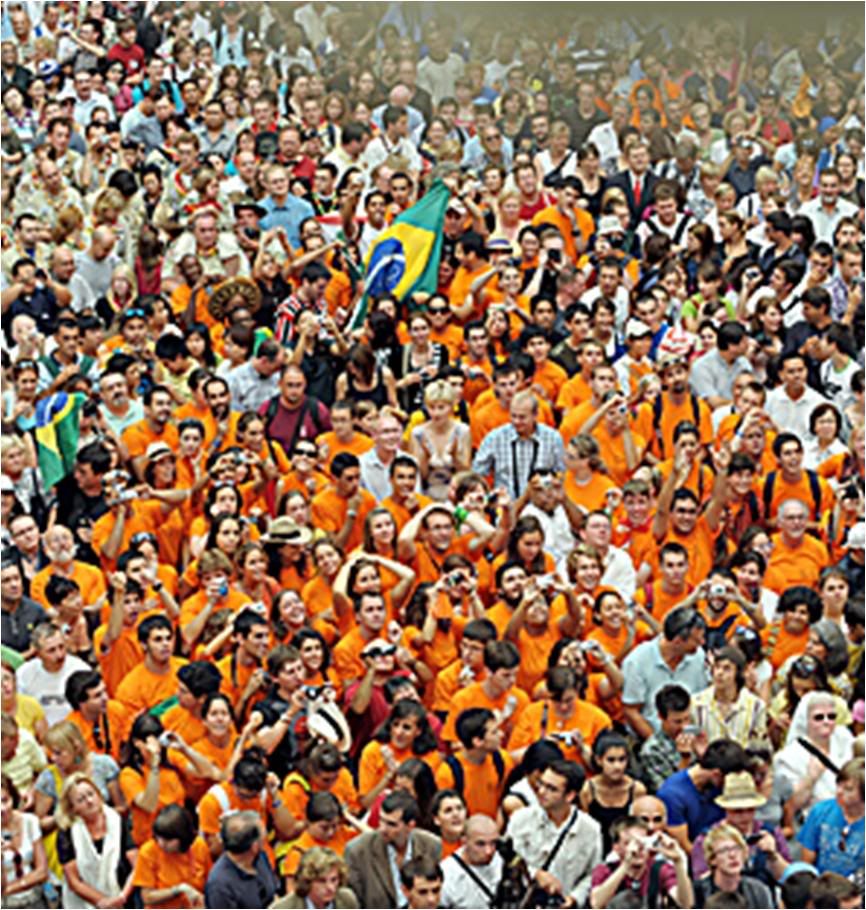
[Modificato da TERESA BENEDETTA 06/08/2009 20:43] |